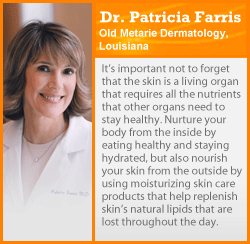Our skin is more than packaging: It's an incredibly complex organ designed to protect us from external elements. And though pollution in air and water can damage the appearance and effectiveness of the skin, there are ways we can help limit the effects.
Beware of air pollution: Airborne toxins cause skin to age prematurely, especially on the face, neck and hands [source: WebMD]. Smog, dirt and dust can all come in contact with the sun's ultraviolet rays, creating free radicals that deplete oxygen in skin cells and hamper collagen production. These highly charged oxygen molecules are harmful to the skin and the body, attacking cells and damaging DNA. This can lead to wrinkles, rough patches and acne, and give skin a dull, gray appearance. Long-term exposure can also cause skin allergies, eczema and blood vessel damage.
Advertisement
Protect your skin by washing your face daily, exfoliating your skin twice a week and applying moisturizer daily. Studies show that using products that contain antioxidants — such as green tea — may combat pollutants in the skin [source: Orlow].
Limit chlorine exposure: Although it's used to treat drinking water, chlorine also a toxic chemical that, in large quantities, can cause serious agitation to the skin and lungs [source: New York Department of Health]. Even in small amounts, the effects can take a toll over time. When you shower, heat opens your pores and allows the chlorine to seep into your skin — stripping away natural oils and causing it to dry, which can lead to wrinkles [source: New York Department of Health]. Reduce time spent in swimming pools and other heavily chlorinated water.
Don't do it to yourself: Smoking is simply another form of air pollution. This is true for both first-hand and second-hand smoke. It causes wrinkles by narrowing blood vessels in your skin, impeding blood flow to your skin while depleting oxygen and essential nutrients. Smoking also damages elastin and collagen — fibers that give skin its elasticity and can cause it to wrinkle prematurely. Cigarette and cigar smoke is also a major source of free radicals, which can further damage and wrinkle skin.
Block the pollution: If you live in a developed country, you can't completely avoid pollution, but there are ways to minimize its effects. Overexposure to UV radiation can cause wrinkles and even skin cancer [source: American Melanoma Foundation]. A good moisturizer hydrates the skin and creates a barrier between your skin and free radicals and other pollutants. To protect yourself, wear sunscreen on your face and neck, and take a daily vitamin C supplement [source: WebMD].
Stay hydrated: One of the best defenses in the battle for healthy skin is also one of the most plentiful elements on Earth. Water hydrates the skin, generates cell growth, improves circulation, helps minimize dark circles under the eyes and improve skin's elasticity. To protect your skin from the effects of water pollution, you can filter your drinking water to remove chlorine and other toxins. Washing your face daily and exfoliating twice a week will remove air pollutants from your skin. Consider using mineral water to avoid the potentially damaging effects of chlorine in tap water [source: Leffell].
Skin naturally begins to lose moisture and elasticity as we age, but by using some of these methods, we can prevent pollution from accelerating that process. To learn more about how to protect your skin from pollution, check out the links and resources on the next page.
Advertisement

